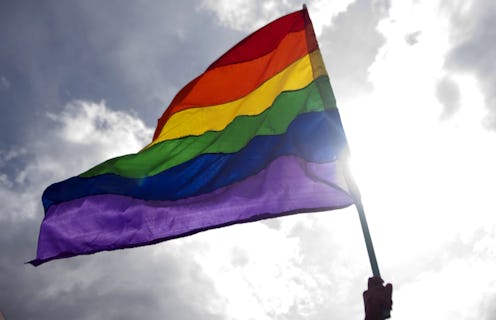Big news for people who identify as nonbinary, feminist, LGBTQ, allies to all of the above, word nerds, and, well, pretty much everyone: Among the new words Dictionary.com just added to its online database today is the gender-neutral honorific “Mx.” It may not be as flashy as some of the other new additions, like “fleek” (as in, to be either on or un-) — but, I would argue, it's definitely one of the most important ones, if not the most important. Here's why.
Mx. isn't a new word; it's actually been around since at least the '70s, and the Oxford English Dictionary began considering it for inclusion earlier this year. (It currently exists on the more informal Oxford English Dictionaries website, but the third print edition isn't due out until 2037) An alternative to Mrs., Mr., or Ms., it's useful both for people who use it out of choice and for those who use it as a way to prevent making any unsupported assumptions about another person: If you don't want to refer to yourself with an honorific that traditionally codes people as “woman,” “man,” or “woman of undetermined marital status” (my least favorite one, because seriously, it should not, nor indeed does not, matter whether a woman is married these days), use Mx.! If you don't want to assume the identity of the person with whom you're speaking, use Mx.! It's great!
It's also just one of many gender-neutral terms currently in use, including pronouns like hir and ze — and as these terms gain more and more visibility, they also help break down the gender binary that so much of society still clings to so fiercely. Words have power, and in this case, they both underline and bolster support for the fact that gender is not a binary.
The one thing, of course, is this: As a relatively recent and web-only tool, Dictionary.com, which was founded in 1995, doesn't have quite the same clout as, say, things like the Oxford English Dictionary or Merriam-Webster — references that began as, and have existed for almost two centuries as, print references. They both added online arms within the last 20 years, Merriam-Webster in 1996 and the OED in 2000; however, the bottom line is that the OED is pretty much the most “legit” dictionary around. (It's been a while since I've written an academic research paper, but back in my day, my professors would only accept the OED as a source — never Dictionary.com.) I can't help but wonder whether having been added to a reference with that sort of reputation would have done more to normalize “Mx.” than being added to Dictionary.com. For what it's worth, Merriam-Webster has a blog post about the word, but not an official entry for it.
Then again, though, there's also this: The OED may be the academic go-to, but Dictionary.com rules in the court of popular opinion. Dictionary.com's definitions are often the first result when you Google for the meanings of specific words after Google's own — above Merriam-Webster, the OED, the Cambridge English Dictionary, and more (go ahead and try it) — and maybe it's that which will ultimately matter more than its history. The more we use something, the more normalized it becomes; so, although my logic might be flawed here, I sort of wonder whether the growing use of Mx. will be aided by the near constant use of Dictionary.com.
Or at least, I hope it will.
Image: Giphy
